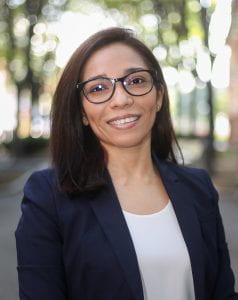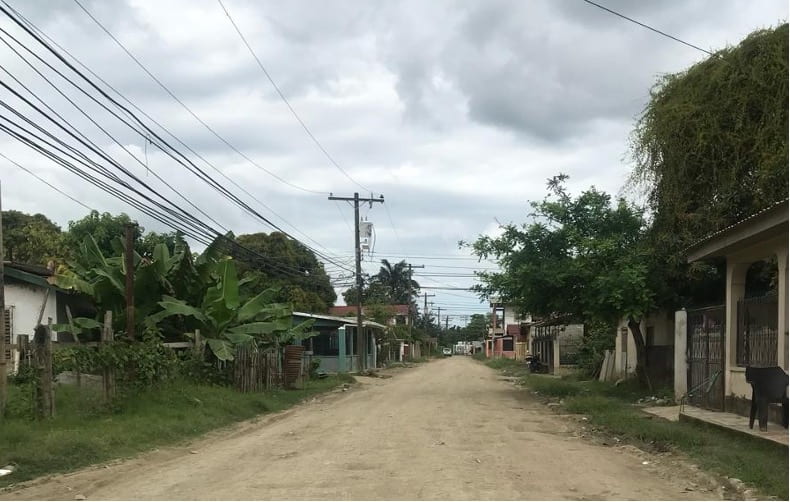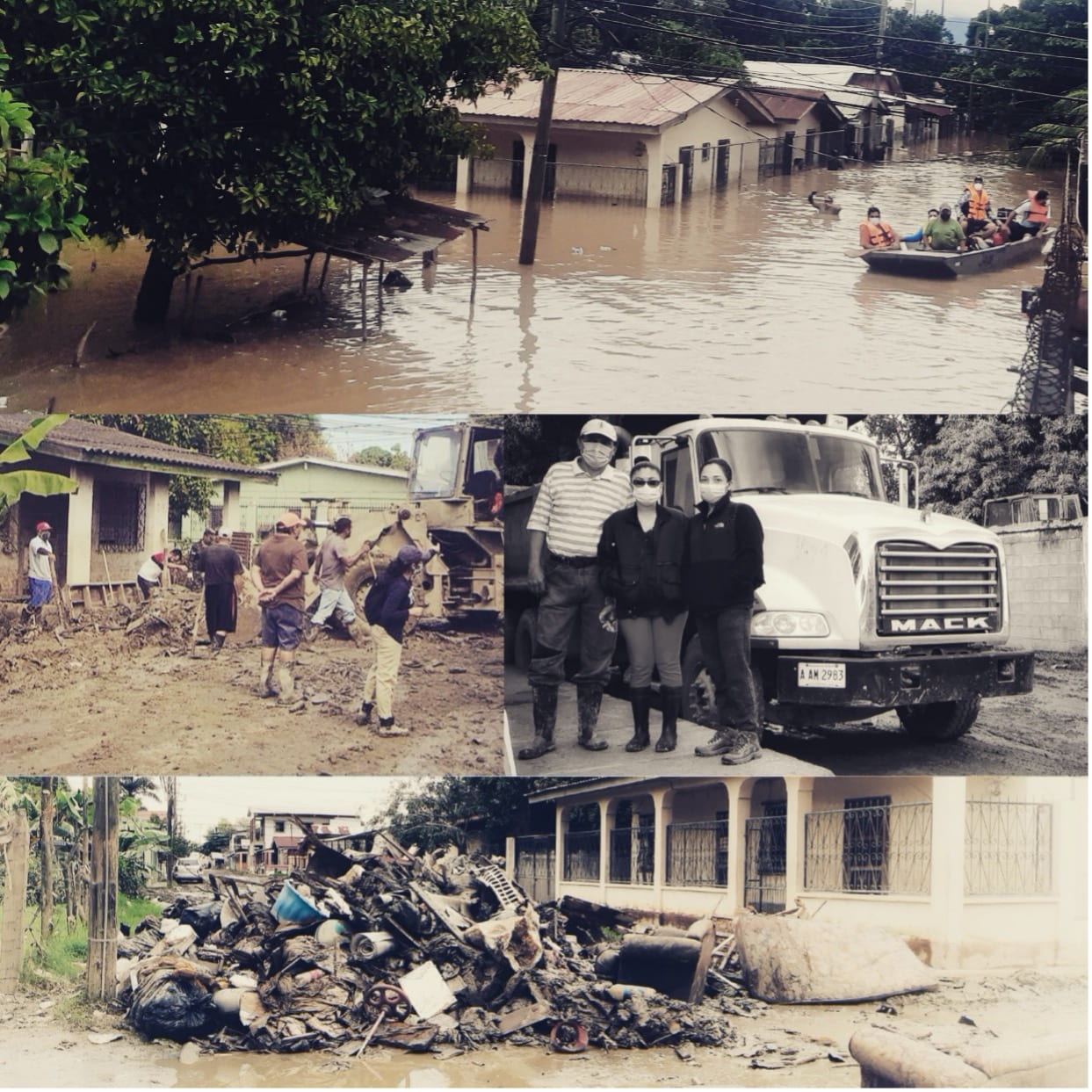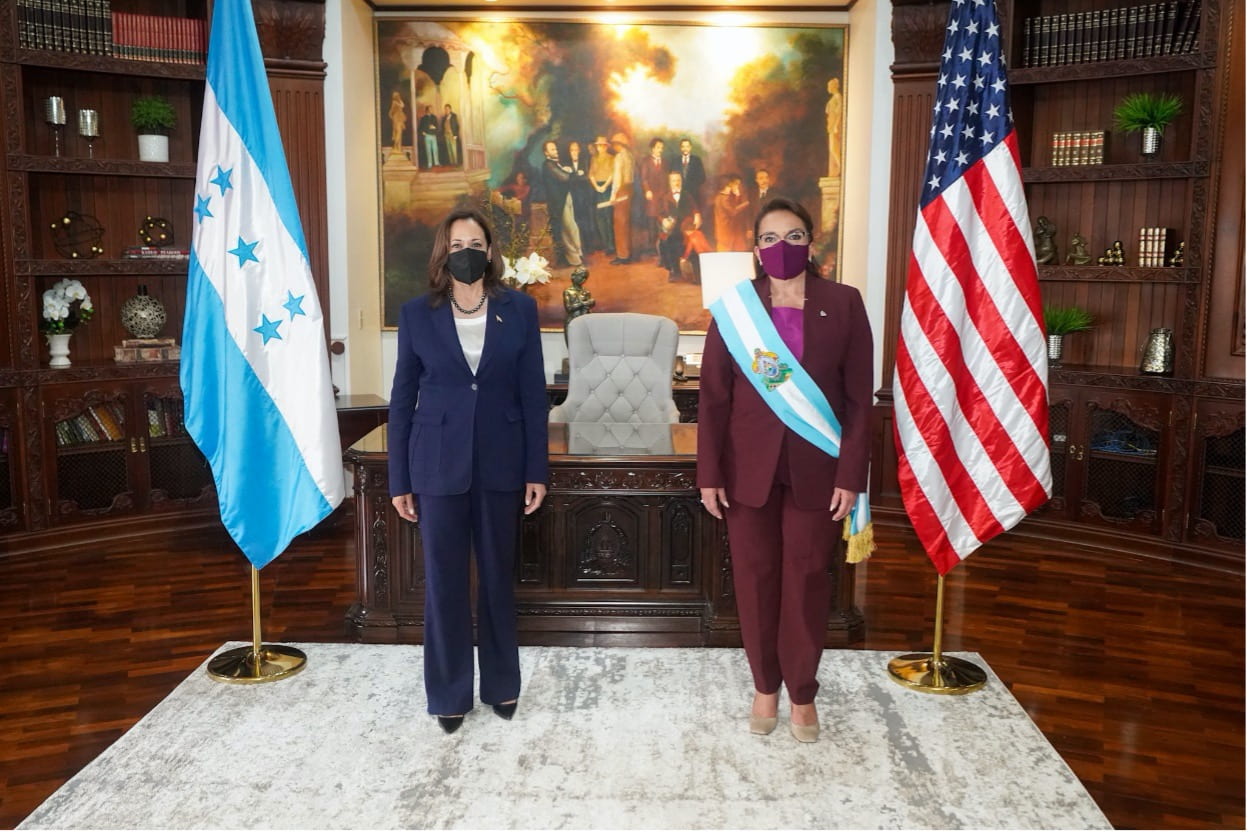
About the Author
Nadia Seren is a Mid-Career Master in Public Administration and Edward S. Mason Fellow at the John F. Kennedy School of Government, Harvard University.
A New Hope for Honduras
Learning from the past, working in the present, shaping the future
“Nadia, Nadia, Nadia…are you coming to play with us today?” Every day after school and yelling at the top of their lungs, the boys of the block would call me and invite me to play soccer with them. With a smile on my face I would put my broken sneakers on, run all the way out to the street to take my position as a striker and have fun. I was agile, and a few minutes into the game scored goals for the team.

Small town in La Lima where Nadia grew up. In the aftermath of hurricanes Eta and Iota many of its habitants decided to migrate to the United States.
I have fond memories of my time growing up in Honduras, where I could often hear the voices of my parents, neighbors and teammates cheering “you can do it” as I ran with the ball towards the goal line. Those voices wired my brain into believing that I could achieve anything I wanted, wherever I was. Now, this type of support system has almost disappeared from Honduran communities. Parents and young people are migrating by the thousands in search for better economic opportunities; streets are permeated by crime; girls and women face never-ceasing violence. However, these are just a few of the visual symptoms of the challenges the country has been grappling with, such as rising corruption, bad governance and poverty.

Migrant caravan heading towards the United States southern border Source: AFP
Almost half of Hondurans lived on less than US$5.50 per day in 2019, making Honduras the second poorest country in Latin America, according to the World Bank. Nevertheless, this estimate was expected to reach 70%—seven out of every ten Hondurans—after the combined impact of the Covid-19 pandemic and hurricanes Eta and Iota in 2020, according to the National Autonomous University of Honduras (UNAH). These hurricanes devastated many communities including mine in La Lima, Cortés. I saw firsthand the hopelessness in people’s faces as they lost their homes and were left without the necessary assistance before and after the floods. It was the solidarity of the people living far from the flooded areas that made it possible for hundreds of families to be rescued and relocated to safer places. The poor response of Honduran institutions in preventing and mitigating the effects of climate change such as this tragedy, was nothing more than the manifestation of twelve years of rampant graft and corruption; which had depleted their capacity to function properly.

Nadia working with the community in the aftermath of hurricanes Eta and Iota.
When the coup d’état in 2009 happened, I was not really aware of the difficult times my country was about to endure or about the dangers of democratic backsliding. As a young engineer in a field in which I would usually be the only woman in the room, I focused my energy on advancing my career and believed that I could contribute my country through my work. Later in 2013, I came to the United States to study at Tufts University with a Fulbright Scholarship. In the meantime, principled leadership was significantly eroding both in the public and private sector in Honduras. Just a few months before my return to the country in 2015, Hondurans turned to streets to protests as a $200-million embezzlement of social security funds was made public. The money was being extracted from the social security health system by kleptocratic networks that used it to fund the political campaign of the governing party.

Nadia at her last job before starting her studies at Harvard Kennedy School.
With such a somber panorama, one might ask, is there still hope for Honduras, its democracy and people? With a resounding yes I can say there is, as a new generation of emerging leaders is determined to transform the country. In November 2017, the turning point came for the Honduran people— including myself—as the unconstitutional re-election of Juan Orlando Hernández took place, bringing with it a profound political crisis and a new wave of corruption in the subsequent four years.
This unfortunate event was the final catalyst that brought me and a few other young professionals together, as we were concerned of the way our country was going. We started to hold conversations with different actors of Honduras’s civil society, who were equally concerned about the country’s condition and from whom we received the same message “you are now the future.” After such talks and thinking more strategically in the long-term impact, we came to the conclusion that we needed to create a new generation of principled leaders, by educating and providing them with the tools to advocate effectively and advance their communities.
This is how Association Despierta Honduras (ADH) was born, an NGO that teaches youths from underserved and high out-migration communities about public policies in sustainability, economic development, governance and social development. We show them how the country is doing on these areas and what we could do differently to build a better future based on democratic principles. Through the workshops and seminars of our program “Honduras Changemakers,” I have seen the thirst for opportunities and change that these young leaders have. The program has become their support system where we instill service to others and also encourage them to become active participants of society. We are letting them know that there is a future in Honduras and that we have to work together to build it.

Seminar on Corruption – Governance area. Source: ADH
Unsurprisingly, young people and those who have been disenfranchised voted in unprecedented numbers in November of 2021, when the first female President of Honduras Xiomara Castro was elected. As one of the first women from Honduras to be in the MPA Program at Harvard Kennedy School, witnessing this moment in history has inspired me and gave me hope for the work that awaits us. The message of the people through this election result is clear, “we want something different.”
This is the moment for change in Honduras, in which inclusion and transparency should be at the center of this work ahead. Collaboration between the private sector, civil society and the public sector will be key to push this change in the right direction. Cooperation with the international community will be necessary as well. On this note, Vice President Kamala Harris who traveled to Honduras for Castro’s inauguration, has launched the Call to Action initiative, a promising plan that aims to “expand opportunities for women, youth and minorities”. It also looks to establish partnerships to support micro, small and medium enterprises (MSMEs), an often overlooked sector that creates seven out of 10 jobs in the Honduran economy.

Vice President Kamala Harris and President Xiomara Castro in Tegucigalpa, January 27, 2022. Source: Twitter – Vice President Kamala Harris.
As I think about this time of transformation, I can’t help but reflect on the words of Jennifer Musisi, who fought corruption through her work as a public administrator in Kampala, Uganda. During an anti-corruption study group at the Ash Center she told me, “When an opportunity to make a change is presented to you, take it”. Now, I welcome this opportunity that has been given to me and to all Hondurans. The work will not be easy but we have to use all of our talents to create a country where everyone can thrive. It is time to bring back prosperity into our communities where girls and boys can play safely, happy and free, like I once did.
More Student Views
Puerto Rico’s Act 60: More Than Economics, a Human Rights Issue
For my senior research analysis project, I chose to examine Puerto Rico’s Act 60 policy. To gain a personal perspective on its impact, I interviewed Nyia Chusan, a Puerto Rican graduate student at Virginia Commonwealth University, who shared her experiences of how gentrification has changed her island:
Beyond Presence: Building Kichwa Community at Harvard
I recently had the pleasure of reuniting with Américo Mendoza-Mori, current assistant professor at St Olaf’s College, at my current institution and alma mater, the University of Wisconsin-Madison. Professor Mendoza-Mori, who was invited to Madison by the university’s Latin American, Caribbean, and Iberian Studies Program, shared how Indigenous languages and knowledges can reshape the ways universities teach, research and engage with communities, both local and abroad.
Of Salamanders and Spirits
I probably could’ve chosen a better day to visit the CIIDIR-IPN for the first time. It was the last week of September and the city had come to a full stop. Citizens barricaded the streets with tarps and plastic chairs, and protest banners covered the walls of the Edificio de Gobierno del Estado de Oaxaca, all demanding fair wages for the state’s educators. It was my first (but certainly not my last) encounter with the fierce political activism that Oaxaca is known for.




